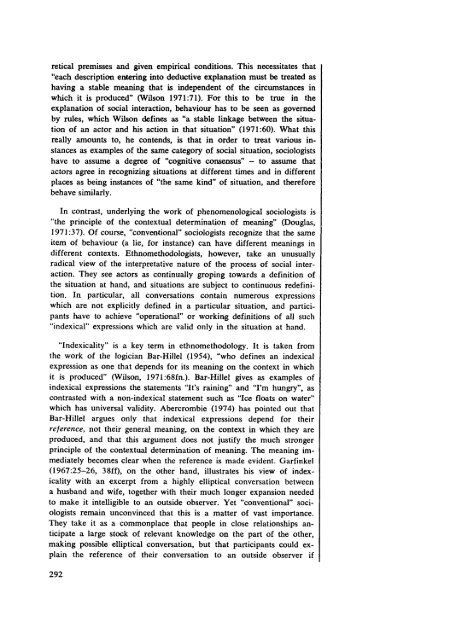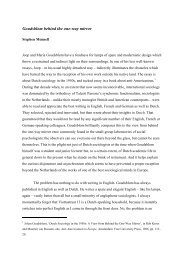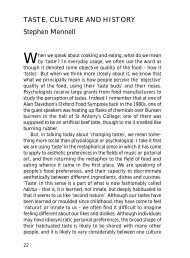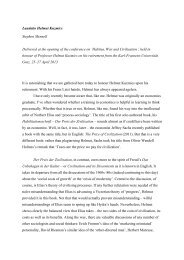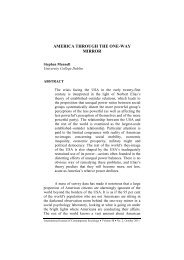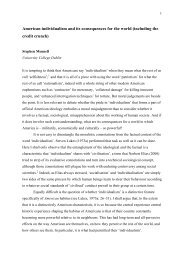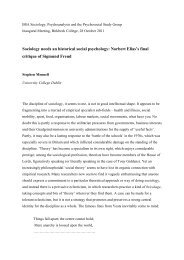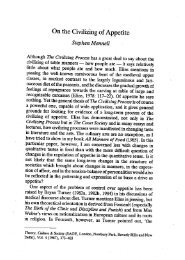Ethnomethodology and the New "Methodenstreit" - Stephen Mennell
Ethnomethodology and the New "Methodenstreit" - Stephen Mennell
Ethnomethodology and the New "Methodenstreit" - Stephen Mennell
Create successful ePaper yourself
Turn your PDF publications into a flip-book with our unique Google optimized e-Paper software.
etical premisses <strong>and</strong> given empirical conditions. This necessitates that"each description entering into deductive explanation must be treated ashaving a stable meaning that is independent of <strong>the</strong> circumstances inwhich it is produced" (Wilson 1971:71). For this to be true in <strong>the</strong>explanation of social interaction, behaviour has to be seen as governedby rules, which Wilson defines as "a stable linkage between <strong>the</strong> situationof an actor <strong>and</strong> his action in that situation" (1971:60). What thisreally amounts to, he contends, is that in order to treat various instancesas examples of <strong>the</strong> same category of social situation, sociologistshave to assume a degree of "cognitive consensus" - to assume thatactors agree in recognizing situations at different times <strong>and</strong> in differentplaces as being instances of "<strong>the</strong> same kind" of situation, <strong>and</strong> <strong>the</strong>reforebehave similarly.In contrast, underlying <strong>the</strong> work of phenomenological sociologists is"<strong>the</strong> principle of <strong>the</strong> contextual determination of meaning" (Douglas,1971:37). Of course, "conventional" sociologists recognize that <strong>the</strong> sameitem of behaviour (a lie, for instance) can have different meanings indifferent contexts. Ethnomethodologists, however, take an unusuallyradical view of <strong>the</strong> interpretative nature of <strong>the</strong> process of social interaction.They see actors as continually groping towards a definition of<strong>the</strong> situation at h<strong>and</strong>, <strong>and</strong> situations are subject to continuous redefinition.In particular, all conversations contain numerous expressionswhich are not explicitly defined in a particular situation, <strong>and</strong> participantshave to achieve "operational" or working definitions of all such"indexical" expressions which are valid only in <strong>the</strong> situation at h<strong>and</strong>."Indexicality" is a key term in ethnomethodology. It is taken from<strong>the</strong> work of <strong>the</strong> logician Bar-Hillel (1954), "who defines an indexicalexpression as one that depends for its meaning on <strong>the</strong> context in whichit is produced" (Wilson, 1971 :68fn.). Bar-Hillel gives as examples ofindexical expressions <strong>the</strong> statements "It's raining" <strong>and</strong> "I'm hungry", ascontrasted with a non-indexical statement such as "Ice floats on water"which has universal validity. Abercrombie (1974) has pointed out thatBar-Hillel argues only that indexical expressions depend for <strong>the</strong>irreference, not <strong>the</strong>ir general meaning, on <strong>the</strong> context in which <strong>the</strong>y areproduoed, <strong>and</strong> that this argument does not justify <strong>the</strong> much strongerprinciple of <strong>the</strong> contextual determination of meaning. The meaning immediatelybecomes clear when <strong>the</strong> reference is made evident. Garfinkel(1967:25-26, 38ff), on <strong>the</strong> o<strong>the</strong>r h<strong>and</strong>, illustrates his view of indexicalitywith an excerpt from a highly elliptical conversation betweena husb<strong>and</strong> <strong>and</strong> wife, toge<strong>the</strong>r with <strong>the</strong>ir much longer expansion neededto make it intelligible to an outside observer. Yet "conventional" sociologistsremain unconvinced that this is a matter of vast importance.They take it as a commonplace that people in close relationships anticipatea large stock of relevant knowledge on <strong>the</strong> part of <strong>the</strong> o<strong>the</strong>r,making possible elliptical conversation, but that participants could explain<strong>the</strong> reference of <strong>the</strong>ir conversation to an outside observer if292


